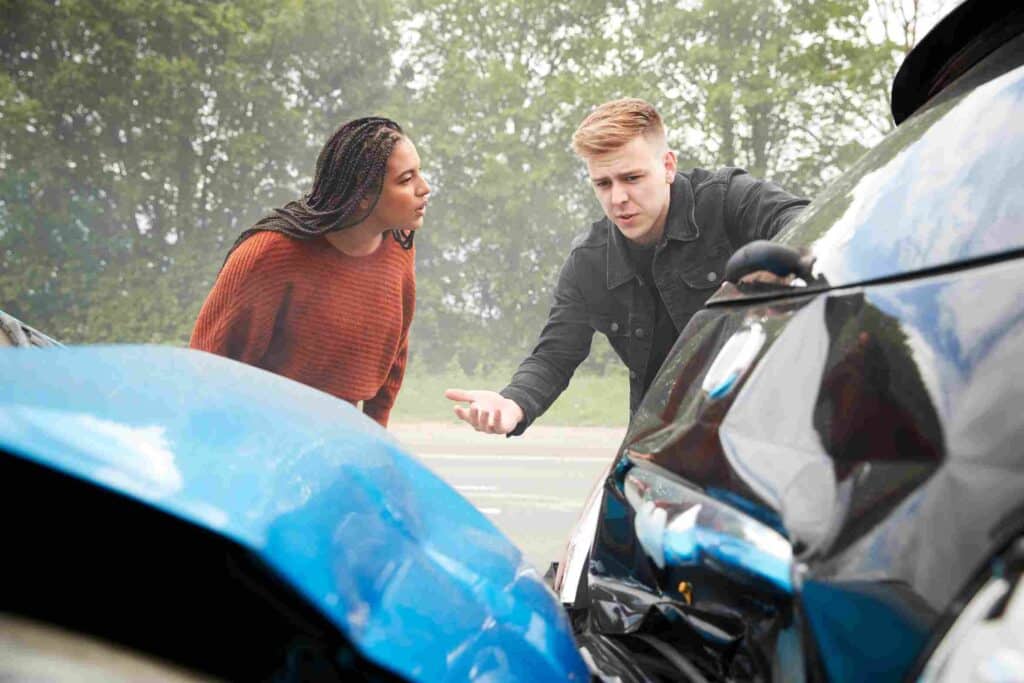Over the last number of years, road rage has become an alarming issue. While stress and frustration behind the wheel are common, escalating emotions can lead to reckless and negligent driving behaviors, putting everyone on the road at risk and increasing the chances of accidents.
Understanding the connection between road rage and car accidents is essential for promoting safer driving practices. If you are involved in an accident due to another driver’s aggressive behavior, consulting a Minnesota car accident lawyer from Nelson Personal Injury, LLC, can provide invaluable assistance in navigating the legal aftermath.
Understanding Road Rage
Road rage is more than just a fleeting moment of impatience; it often stems from deep-rooted psychological triggers. Stress from personal life, work deadlines, and the pressures of modern living can accumulate, making drivers more susceptible to aggressive behavior.
When behind the wheel, the perceived anonymity and isolation of the car can embolden individuals to act out in ways they typically wouldn’t in face-to-face interactions.
Common Behaviors Associated with Road Rage
Several behaviors are indicative of road rage, ranging from mild to severe. Tailgating, excessive honking, rude gestures, and shouting at other drivers are all commonplace.
In extreme cases, drivers may engage in dangerous actions like cutting off other vehicles, deliberate, sudden braking, or even initiating physical confrontations. These behaviors heighten the risk of accidents and create a hostile driving environment for everyone.
The Impact on Road Safety
The link between road rage and car accidents is concerning. Aggressive driving reduces reaction time and increases the likelihood of making critical safe driving errors.
Speeding and weaving through traffic, common road rage behaviors, significantly elevate the risk of collisions. According to traffic safety statistics, a substantial percentage of car accidents are attributed to aggressive driving.
For instance, if a driver succumbs to road rage and causes an accident, the ramifications extend beyond physical injuries, and can also involve emotional distress, and legal challenges.
Legal Repercussions
Being involved in a road rage-induced accident can have severe legal repercussions. Victims of such incidents can seek recourse through legal channels.
Consulting with an experienced Minnesota car accident lawyer is crucial for understanding your rights and options. Our lawyers can help gather evidence, negotiate with insurance companies, and, if necessary, represent you in court to ensure you receive fair compensation for your injuries and damages.
The Psychology Behind Road Rage
It is important to understand the psychology behind road rage. Some of the factors that impact this situation are found here.
Emotional Triggers
Road rage often finds its roots in strong emotional triggers. Anger, frustration, and stress accumulated throughout the day can result in explosive reactions when one gets behind the wheel.
Instances such as being stuck in traffic, being cut off by another driver, or running late for an appointment can exacerbate these emotions. The nature of driving itself, where every second and inch counts, can sometimes act as a catalyst, turning minor irritations into major outbursts.
Understanding these emotional triggers can be the first step toward mitigating road rage incidents.
Personality Traits and Road Rage
Certain personality traits may predispose individuals to road rage. People who score high on aggression, competitiveness, and impatience are likelier to exhibit aggressive driving behaviors.
Additionally, individuals with a low tolerance for frustration or those who have difficulty managing stress are more susceptible. Knowing your personality type or recognizing these traits can help develop better coping mechanisms to prevent road rage.
Cognitive Factors
Cognitive factors also play a significant role in road rage incidents. Misinterpreting other drivers’ actions, unrealistic expectations about driving conditions, and a heightened sense of territoriality on the road can lead to increased aggression.
For example, seeing a driver switch lanes without signaling might be perceived as a personal affront rather than a simple oversight. Cognitive-behavioral strategies that focus on reinterpreting these situations less hostilely can effectively reduce road rage.
Impact of Past Experiences
Past driving experiences can shape how individuals react to certain situations. Drivers who have previously been in accidents or have had near-misses may feel heightened anxiety and suspicion, making them more prone to road rage.
These past experiences can create a cycle of fear and aggression that perpetuates negative driving attitudes and behaviors. Talking to a mental health professional or engaging in stress-reduction techniques can benefit those whose past experiences significantly impact their current driving habits.
Societal and Cultural Influences
Societal and cultural norms can also influence the prevalence of road rage. In cultures where aggressive driving is more socially accepted or where there is a lack of strict traffic enforcement, road rage incidents may be more common.
Conversely, cultures that value politeness and patience may see fewer instances of road rage. Understanding and adhering to societal norms of driving etiquette can play a crucial role in reducing aggressive driving behaviors.
Consequences of Road Rage
Understanding the consequences of road rage is essential to grasp the seriousness of this issue. Road rage not only jeopardizes the safety of those involved but can also lead to significant legal, financial, and personal repercussions.
The following sections detail the various consequences that arise from road rage incidents.
Physical Injuries
One of the most immediate and severe consequences of road rage is physical injury. Aggressive driving behaviors increase the likelihood of accidents, which can seriously harm drivers, passengers, and pedestrians.
These injuries can range from minor cuts and bruises to life-altering conditions like orthopedic injuries, spinal cord injuries, or traumatic brain injuries. The physical toll of road rage emphasizes the need for better emotional regulation while driving.
Emotional and Psychological Effects
Beyond physical harm, road rage can leave lasting emotional and psychological scars. Victims and perpetrators alike may suffer from anxiety, post-traumatic stress disorder (PTSD), and other mental health issues following a road rage incident.
These psychological effects can hinder daily functioning, making driving or even performing routine tasks difficult without experiencing heightened stress or fear.
Financial Burden
The financial implications of road rage can be staggering. Some of the immediate costs are vehicle damage repair, medical expenses, wage loss, and increased insurance premiums.
In more severe cases, individuals may face long-term financial strain due to permanent injuries, required future medical care, and ongoing lost wages if they cannot return to work.
Legal Consequences
Road rage incidents often lead to legal repercussions. Depending on the severity of the situation, individuals involved may face fines, loss of driving privileges, or even incarceration.
Criminal charges such as reckless driving, assault, and endangerment are not uncommon in cases of extreme road rage. Consulting with an injury attorney in Minnesota is crucial for navigating these legal complexities and protecting your rights.
Impact on Relationships
Aggressive driving behaviors and the resulting incidents can strain personal relationships. The stress and emotional turmoil associated with road rage can spill over into one’s personal life, affecting family dynamics, friendships, and even professional relationships.
Loved ones may find it challenging to understand the emotional triggers and may distance themselves, further isolating the individual.
The consequences of road rage extend far beyond the immediate moment of anger and aggression. From physical injuries and emotional trauma to financial strain and legal battles, the ramifications are profound and far-reaching.
Preventing Road Rage
Understanding how to prevent road rage is crucial for fostering a safer driving environment. By adopting certain practices and behavioral strategies, drivers can reduce the likelihood of road rage incidents and improve overall road safety.
The following sections outline effective methods for preventing road rage.
Stay Calm and Composed
One of the most effective ways to prevent road rage is to maintain a calm demeanor while driving. This involves recognizing potential stressors and responding to them in a controlled manner. If you become agitated, take deep breaths, listen to soothing music, or practice mindfulness techniques to control your emotions.
Allow Extra Travel Time
Time pressure is a significant trigger for road rage. By allowing extra time for travel, drivers can reduce stress and avoid the rush that often leads to aggressive driving behaviors. Plan your route and account for delays to maintain a relaxed and patient attitude.
Avoid Eye Contact and Gestures
Engaging with aggressive drivers through eye contact or gestures can escalate tensions. If confronted with an irate driver, it’s best to avoid eye contact and refrain from making any hand gestures, as these actions can be interpreted as confrontational. Instead, focus on driving safely and calmly.
Practice Empathetic Driving
Empathetic driving involves considering the experiences and feelings of other road users. You can diffuse potential conflicts by showing patience and understanding towards fellow drivers. Remember that everyone makes mistakes, and practicing forgiveness can go a long way in preventing road rage.
Use Defensive Driving Techniques
Defensive driving techniques, such as maintaining a safe following distance, obeying traffic laws, and being aware of your surroundings, can help prevent road rage incidents. These practices keep you safe and reduce the chances of provoking or being provoked by other drivers.
Seek Professional Help
For those who struggle with managing their emotions while driving, seeking professional help can be beneficial. Cognitive-behavioral therapy (CBT) and other counseling methods can provide strategies for controlling anger and reducing aggressive tendencies. Mental health professionals can offer personalized guidance to improve emotional regulation.
Legal Help After a Road Rage Incident
Navigating the aftermath of a road rage incident can be overwhelming, especially when legal matters are involved. Seeking legal assistance is crucial for understanding your rights, protecting your interests, and ensuring a fair resolution.
The following sections outline the necessary steps and considerations when obtaining legal help after a road rage incident.
Contacting a Lawyer
The first step after a road rage incident is contacting an experienced lawyer specializing in car accidents or personal injury cases. A knowledgeable attorney can provide critical advice on how to proceed, helping you navigate the complexities of the Minnesota legal system. They can evaluate your case, determine liability, coordinate insurance benefits, and guide you through filing a claim or lawsuit.
Gathering Evidence
Your lawyer will assist you in gathering crucial evidence to support your case. This evidence may include police reports, witness statements, medical records, and photos or videos of the incident scene. Accurate documentation adds credibility to your claim and can significantly impact the outcome of your case.
Understanding Your Rights
Legal counsel ensures that you fully understand your rights and the potential outcomes of your case. Depending on the severity of the incident, you may be entitled to compensation for medical expenses, vehicle repairs, lost wages, and pain and suffering. Your lawyer will explain your legal options, helping you make informed decisions.
Negotiating with Insurance Companies
Insurance companies often aim to settle claims quickly and for the least amount possible. An experienced lawyer will negotiate to ensure you receive fair compensation. They can handle all communications with the insurance companies, preventing you from making statements that could inadvertently harm your case.
Preparing for Court
Your lawyer will prepare your case for court if a settlement cannot be reached. This involves drafting legal documents, building a strong argument, and representing you during the trial. An adept attorney will strive to achieve the best possible outcome, advocating for your rights throughout litigation.
Understanding Road Rage and Its Impact on Car Accidents
Addressing road rage effectively requires proactive emotional management and adherence to safe driving practices. By staying calm, planning, avoiding confrontations, practicing empathy, and using defensive driving techniques, drivers can significantly reduce the occurrence and impact of road rage incidents.
Additionally, if you find yourself involved in a road rage event, seeking legal help is imperative. Contacting an experienced attorney, gathering relevant evidence, understanding your rights, negotiating with insurance companies, and preparing for court are critical steps to ensure justice and fair resolution.
The attorneys at Nelson Personal Injury have decades of experience handling car accident claims, including claims involving road rage. If you have been involved in a car accident, contact one of our experienced lawyers today for a free consultation.




